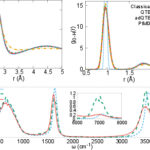The adaptive quantum thermal bath for a quantum treatment of atomic nuclei

When modeling matter at the atomic scale, the behavior of electrons is described by the laws of quantum mechanics, but atomic nuclei, being heavier, are often treated as classical objects, obeying Newton’s laws. This approximation greatly simplifies simulations, but it can lead to non-negligible errors, especially when light atoms such as hydrogen are involved. Some phenomena, such as isotope effects, even escape the classical description of atomic nuclei entirely. Researchers from the “Low-dimensional oxides” group at INSP, in collaboration with the Theoretical Chemistry Laboratory of Sorbonne Université, improved a recently developed method, the adaptive quantum thermal bath (QTB), which allows for a quantum treatment of the nuclei at a computational cost close to that of classical simulations. They show that the adaptive QTB is able to capture the subtle quantum effects at play in liquid water, which opens up promising perspectives, especially for the quantum modeling of hydrogen bonds in biological matter.
Faitd’actu_jan_2022_ENLegende : Liquid watersimulations
Top: radial distribution functions obtained by different molecular dynamics methods, classical or quantum. Adaptive QTB (adQTB) coincides with the quantum reference result (path integrals, PIMD), which is not the case of either classical or standard QTB simulations.
Bottom: Corresponding infrared absorption spectra. The inset shows an anharmonic resonance that only the adQTB is able to correctly describe, whereas classical and TRPMD (path-integral based) simulations greatly underestimate its amplitude.
Reference
« Nuclear Quantum Effects in Liquid Water at Near Classical Computational Cost Using the Adaptive Quantum Thermal Bath »
Nastasia Mauger, Thomas Plé, Louis Lagardère, Sara Bonella, Étienne Mangaud, Jean-Philip Piquemal, Simon Huppert
The Journal of Physical Chemistry Letters, 12 (34), 8285 (2021)
Article Simon Huppert : huppert(at)insp.jussieu.fr
